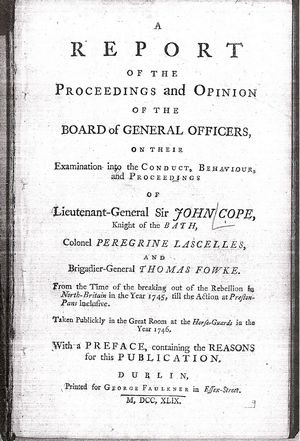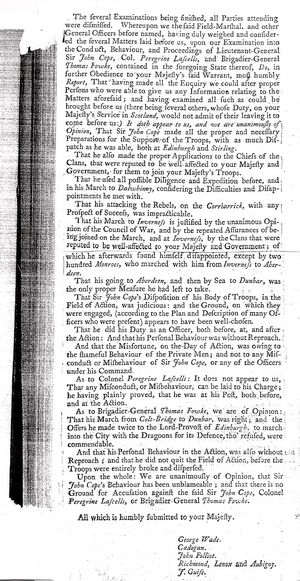Examination into The Conduct Behaviour and Proceedings of Lieutenant-General Sir John Cope KB et al: September 1746

Cumberland had gained his Victory and now Sir John Cope had to explain what precisely happened in North Britain during the seven weeks from The Prince's landing till Cope's defeat at Prestonpans - August 5th/ September 21st 1745
The Examination convened under Royal Warrant by Field Marshal George Wade is seen either as a genuine and proper vindication of Cope's actions or a whitewash of the General. The disbelievers argue that baking bread and the no-show of countless Clans who were supposedly "well-affected towards the King and his government" were poor alibis. If Cope had been a wiser and more effective leader he could have concluded Prince Charles Edward's campaign in three weeks and thereby saved a great deal of anxiety in Edinburgh and London. He could have made greater preparations from August 3rd when he received notice that the Prince had sailed from France and from the 8th when he learnt the Prince had landed at Arisaig. If he had there would have been no battle joined in Prestonpans, no flowering of the Hope and Ambition that followed. So it can be seen that the Hanoverian Government's side of the story has its own "What if?" to match the Prince's Derby "What if?" question.
How did Cope achieve his Vindication?
The Proceedings in 100 pages show Cope recounting his version of the saga in minute detail and enlisting the support in person and in writing of countless fellow officers in the field, of Quarter Master Earl of Loudon and of the Earl of Home. Every one without fail endorsed his version of events. There was virtually no cross examination, merely clarification. He was either speaking the total truth or he attracted the very greatest loyalty from his officers who had no wish to contradict. In particular his decision, once he believed the Highlanders were in greater strength on the Corriarrick, to avoid an early engagement and retreat to Inverness rather than proceeding [as planned and agreed with Marquis of Tweeddale, Secretary of State for North Britain] to Fort Augustus, was adroitly made after seeking the unanimous views of all his officers in a Council of War at Dalwhinny and ensuring they all signed up to the tactic.
The sole dissenting voice raised in the Proceedings was of a Mr Richard Jack, supposedly a mathematics professor from Edinburgh, who had presented himself on the battle scene and proffered unsolicited advice to the artillery in a most extraordinary manner. He gave a range of contrary opinions on what transpired at Prestonpans which were clearly not taken seriously in the face of so much corroboration from fellow officers of Sir John' telling of the historic occasion, and a point by point refutation by Cope.
At the conclusion of the Proceedings Cope and his fellow senior officers Colonel Lascelles and Brigadier-General Fowke got the verdict they needed. In particular, the entire blame for the defeat at Prestonpans was placed on the Private Men in the dragoons, the artillery and the regiments of foot who panicked and ran in the face of the Highlanders onslaught whilst the Officers did all they could to rally them before leaving the field.
click on text below for the Conclusions reached at the Proceedings

Published Date: October 17th 2007
|





